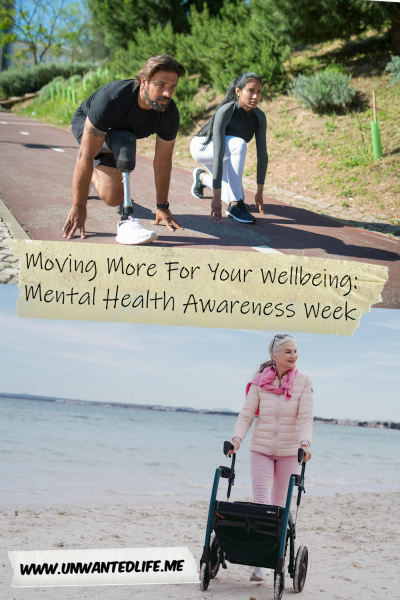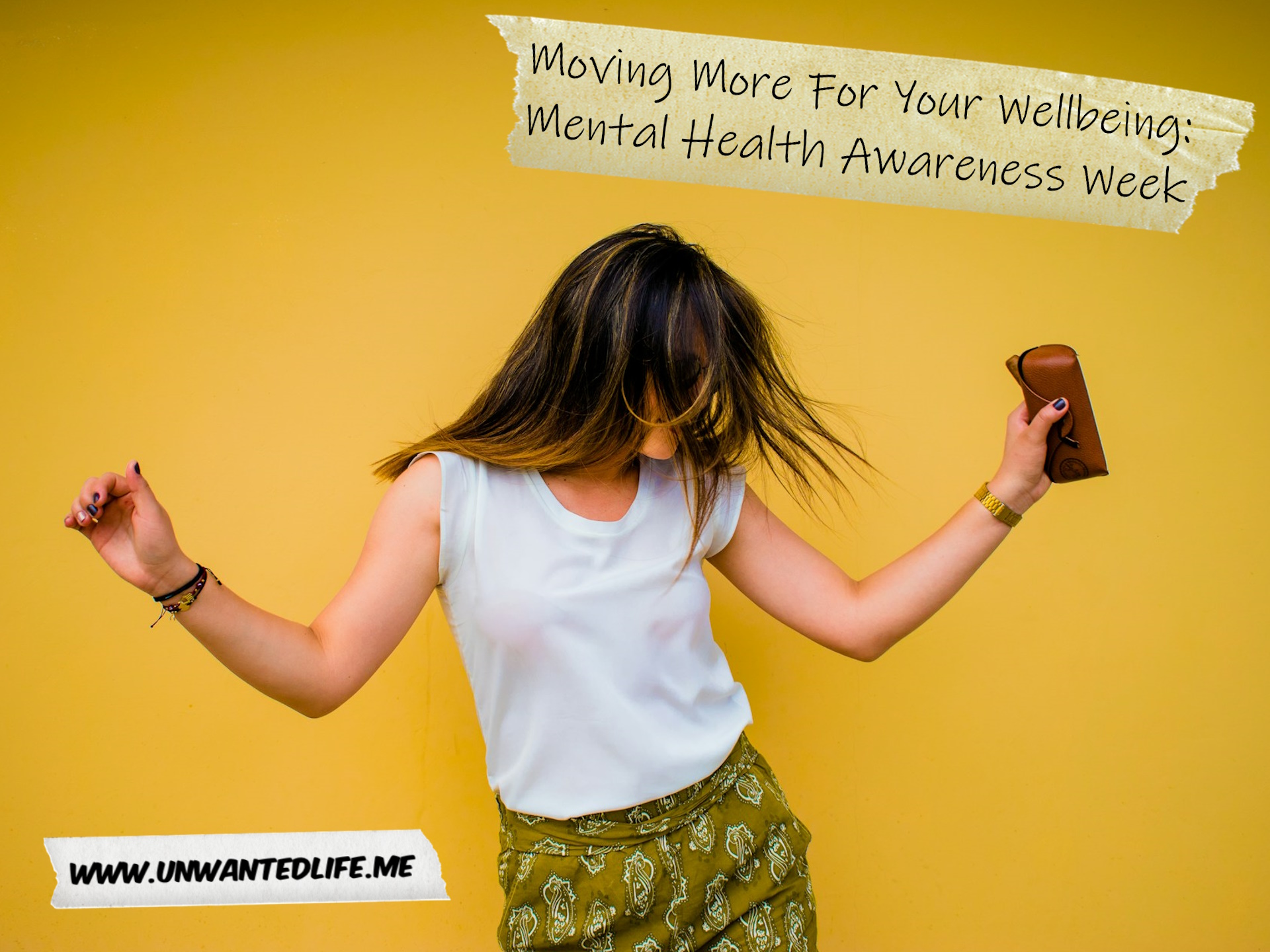When boosting your mental health, even small movements at home can make a big difference, such as micro workouts. As moving more is this year’s theme for Mental Health Awareness Week, I’ve created this article to help you get moving more.
Moving More For Mental Health Awareness Week
How often do you find yourself ‘waiting’ throughout the day, and doing nothing while you wait (Mental Health Foundation), except maybe doing some doomscrolling on your phone? Much like I said when talking about micro workouts, use that waiting time to start moving more.
We all know exercise is good for us, but exercise isn’t a one-size-fits-all situation. I know my health issues, at present, make exercising more difficult than I’d like. Because of my binge eating habit of my long battle with eating disorders, made worse by my reactive hyperglycaemia stopping me from starving myself, I’m now at risk of type 2 diabetes. Moving more will help me here, as it will all of us.
A study by Dempsey, Owen, Yates, Kingwell, and Dunstan (2016) found some interesting results. They concluded that there is consistent evidence that moving more by breaking up prolonged sitting by doing light-intensity physical activities and standing more works as a good type 2 diabetes prevention and management.
Barriers such as health issues, exercise history, the fatigue that comes with exercising, cost, and availability of exercise facilities all play a role (Vancampfort, Stubbs, Ward, Teasdale, and Rosenbaum, 2015). But here’s the thing, we’re not all going to be working out to be bodybuilders. We can start by moving more and taking it from there. You don’t need to go big. Going small is fine too.
Moving More Suggestions
These moving more suggestions are all “no gym required” options, so it’s good for your bank balance and how much time you have to spend on moving more.
Gentle stretches
Start your day by taking a few minutes to gently stretch your body. Reach for your toes, roll your shoulders, and stretch your arms overhead. Focus on your breath and how your body feels with each movement.
After a long day, unwind with some relaxing stretches. Focus on areas that tend to hold tension, like your neck, shoulders, and lower back. Hold each stretch for 15-30 seconds and breathe deeply.
Low-impact movement
Sometimes you just need a mini-movement break like walking in place. Get your heart rate up slightly by walking in place for a few minutes. You can even add arm movements for an extra challenge.
Dancing to upbeat music
Put on your favourite tunes and get dancing. Even a few minutes of free-flowing movement by dancing like no one’s watching can improve your mood and reduce stress. So put on some music and let loose, as it’s a fun way to get your heart rate up and improve your mood.
Short yoga session
There are many short yoga sequences available online, like on YouTube, that is specifically designed for beginners or for stress relief. There are also yoga apps. Yoga combines gentle movement with breathwork and mindfulness, promoting relaxation and focus.
Taking a few minutes to focus on your breath can be surprisingly calming as well. Try a simple technique like box breathing: inhale for 4 seconds, hold for 4 seconds, exhale for 4 seconds, and hold for 4 seconds. Repeat for several minutes.
For other breathing exercises, check out my 10 breathing exercises article by clicking here.
Brisk walk
Go for a walk wherever takes your fancy. But if you have access to a green space, like a park, then step outside for a few minutes of fresh air and go for a walk, as green spaces and nature are good for mental wellbeing as well. Even looking at greenery or listening to birds chirping can be beneficial.
Exercising at your deck
It might not seem like there’s much you can do to help get you moving more while at your desk, but you’d be surprised. For example, you have calf raises, oblique twists, leg lifts, seated leg extensions, and glute squeezes, to name a few.
Because I’m recovering from a repetitive strain injury from doing DIY, sigh, I’ve been given exercises that I can do while sitting in and working. Makes it easier to be self-disciplined.
Moving More Bonuses
Mood booster
Exercise releases endorphins, those feel-good chemicals in your brain that can elevate your mood and reduce stress.
Combating low mood
Even a short burst of exercise can significantly improve symptoms of depression and anxiety.
Stress reduction
Physical activity helps your body manage stress hormones like cortisol. This can leave you feeling calmer and more relaxed.
Clearing your head
People often find that exercise can be a great way to de-stress and clear your mind. It can provide a distraction from worries and allow you to focus on your body and breath. Another way to clear your head is journaling.

Improves sleep
Regular exercise promotes better sleep quality, leading to increased energy and focus during the day. Physical activity can help you fall asleep faster and experience deeper, more restful sleep.
Confidence and self-esteem
When you take care of your body through exercise, you may feel physically stronger and more capable. This can translate to improved self-esteem and confidence.
Goals
Making moving more a goal can give you a sense of accomplishment and boost your self-belief. You may even find yourself setting fitness and workout goals.
Socialising
Joining team sports or exercising with others provides a social aspect and some friendly competition that can make moving more, more fun. Working out with a friend can also boost motivation and increase self-discipline.
Sharper mind
Regular exercise can improve cognitive function, memory, and focus. It can even help protect against cognitive decline as you age.
Summary
Remember, consistency is key. Even small movements done regularly can make a big difference. Find what works for you, such as micro workouts. Experiment with different activities and see what helps you feel your best. Don’t be afraid to get creative.
Finding something you enjoy will make it more likely that you’ll stick with an exercise routine. There are endless possibilities for easy movements at home. By incorporating these simple movements into your daily routine, you can take charge of your mental health and feel better overall.
Don’t push yourself too hard, especially when starting. Take rest days and listen to your body’s signals. And don’t forget to celebrate your progress. Reaching milestones, no matter how small, can keep you motivated. Moving more can be a powerful tool for improving your mental health. So lace up your shoes, put on your favourite tunes, and get your body moving. You’ll be glad you did.
As always, leave your feedback in the comments section below. Also, please share your experiences with moving more in the comments section below as well. Don’t forget, if you want to stay up-to-date with my blog, then sign up for my newsletter below. Alternatively, click the red bell icon in the bottom right corner to get push notifications for new articles.
Lastly, if you’d like to support my blog, then there are PayPal and Ko-fi donation payment options below. Until next time, Unwanted Life readers.
References
Dempsey, P. C., Owen, N., Yates, T. E., Kingwell, B. A., & Dunstan, D. W. (2016). Sitting less and moving more: improved glycaemic control for type 2 diabetes prevention and management. Current diabetes reports, 16, 1-15. Retrieved from https://www.researchgate.net/profile/Paddy-Dempsey/publication/308962701_Sitting_Less_and_Moving_More_Improved_Glycaemic_Control_for_Type_2_Diabetes_Prevention_and_Management/links/580fd7f408ae009606bb8d19/Sitting-Less-and-Moving-More-Improved-Glycaemic-Control-for-Type-2-Diabetes-Prevention-and-Management.pdf.
Vancampfort, D., Stubbs, B., Ward, P. B., Teasdale, S., & Rosenbaum, S. (2015). Why moving more should be promoted for severe mental illness. The Lancet Psychiatry, 2(4), 295. Retrieved from https://www.thelancet.com/journals/lanpsy/article/PIIS2215-0366(15)00099-1/fulltext.


Great tips for anyone looking to start working out! As you mentioned, youtube as some excellent workout videos which that is how I began on my workout journey. The important thing is to find an exercise regiment that you enjoy.
YouTube has so much content when it comes to exercise. But I started by doing simple exercises while watching TV to get myself moving more. Thanks for sharing
I was jsut telling my partner about dacning as exercies haha. I LOVE doing that from time to time. I try vareity of such as some day I do gentle stretch and moving around and other days try something else like dancing and doing micro workouts.
Looove this, so spot on on every front! When I had a really stressful break-up years ago I took up running to shed off some of that stress and emotional burden. Bloody well it worked! But it also improved my health, appetite, quality of sleep, everything you listed. Nowadays I’m a lot lazier but I found these few minutes long training videos on TikTok that are super simple, so I start each morning with couple of them. Takes about 10min of my day, but guarantees a better start for the day.
Teresa Maria | Outlandish Blog
Sounds like a good way to start the day. Thanks for sharing
Great post! I started exercising a couple of years ago, and it’s made such a difference to my mental health. I think physical and mental health go hand in hand – we need to nourish both to feel happy and healthy. Thank you for sharing this helpful guide, it’s so important to raise awareness for mental health x
Indeed we do need to make time to nourish both. Thanks for commenting
This was really eye opening! Great post. I love dancing and I work at a desk all day, will be doing this from now thank you
Who doesn’t love dancing. Thanks for commenting
So true! Moving around is key for feeling great overall. I try to hit the gym a few times a week, but if I can’t, I still make sure to stretch, walk, or dance. It helps reduce stress, boost my mood, and keeps me fit.
It can be hard to always find time for the gym, so having a simpler backup you can do at home is the next best thing. Thanks for commenting
Movement is so very important to the mind, body, and soul. When my father was in his early 50s, he changed his lifestyle, began moving, eating better, and being a bit more disciplined. He just turned 85, and yes he was diagnosed with Parkinson’s, but he was 82 (very late for a diagnosis, 60s is average). His neurologist attributes his later diagnosis to his movement and better lifestyle choices. His was 30 minutes on a bike and light weights. He still exercises every day because he feels better for doing it. Plus, it helps with the natural aging process. I especially like how your post focuses on such a wide range of movement choices and options. Starting small is starting. And it’s funny how a five-minute walk (walk, stretch, breathing, movement) will morph into a ten-minute one and then into a fifteen-minute one, and so on until it feels good and you’re excited. Great post!
Sorry to hear about your father’s diagnosis. My granddad had dementia. I wouldn’t wish these conditions on anyone. My granddad was also fairly active like your dad. He loved working in the garden and for my entire childhood, my granddad would cycle across town to our house to drop off the food he’d grown and to catch up.
Thank you for sharing
Take a dance class! It’s fun
Indeed it is
This is such a helpful reminder that even small movements throughout the day can have a big impact on our mental and physical health. I love the idea of using waiting time to fit in micro workouts!
Great reminder that even small movements matter! Mental Health Awareness Week is the perfect time to start new healthy habits